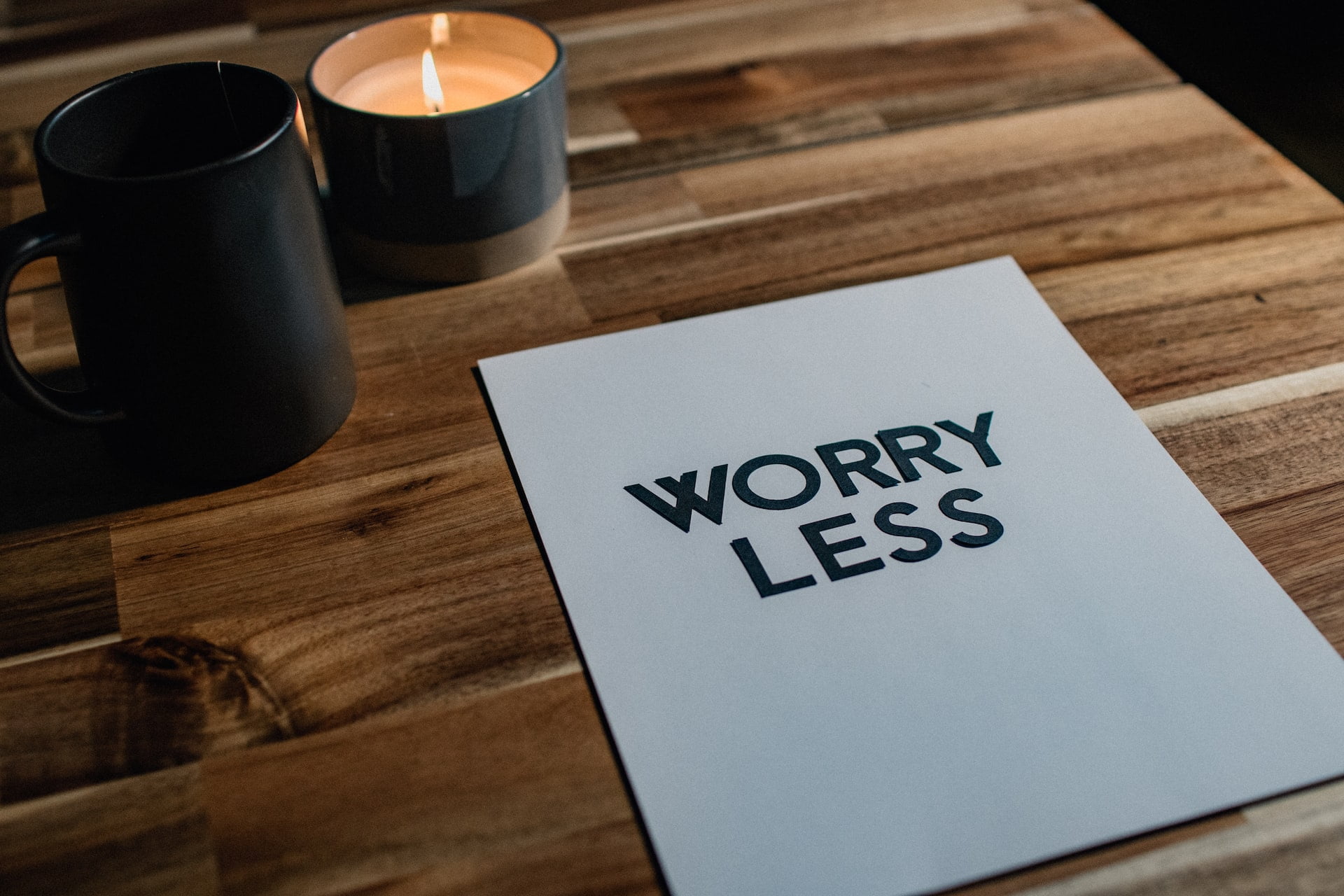Occasional worry is a normal part of life. It is a natural human response to uncertainty and can be beneficial when it pushes you to find a solution and spurs you to action. Chronic worry, on the other hand, can severely impact your mental and physical well-being. It is a mental habit that can be paralyzing and drain your emotional energy. You need to stop worrying.
The good news is that chronic worry is a habit that can be broken. You can learn how to view your circumstances from a more balanced, less fearful perspective, and train your brain to stay calm.
Worry pretends to be necessary, but serves no useful purpose. – Eckhart Tolle
Common triggers that cause people to worry.

There are a variety of things that can lead to worry. Understanding what they are in your life will help you address them. Common triggers include:
- Major life changes
- Financial challenges
- Conflict within relationships
- Stress at work
- Health issues
- Too many commitments or responsibilities
- Lack of time
Techniques that can help you stop worrying.
Discover the root of your fears .
Before you can learn how to stop worrying, you need to reflect on what is causing you to do it. Dive into why you worry about the things that you do and what triggers it. Identifying what is at the core of your anxious thoughts can help you find more effective ways to manage them. Wylie Christian Counseling can walk with you through this process, helping you uncover the root causes of worry and develop healthier, faith-based strategies for lasting peace.
Fact check your thoughts.
Rather than fixating your thoughts on “what ifs” and worst-case scenarios, rethink your fears. Remind yourself that thoughts are not facts. Ask yourself how realistic your fears are. Is there evidence to back them up? How likely is it that what you are worrying about will occur?
Do some deep breathing.
Worry can cause your breathing to become faster and shallower, which intensifies feelings of anxiety. Deep breathing helps calm you down by slowing your heart rate, relaxing your muscles, and stopping your thoughts from racing. One common deep breathing technique is box breathing. This is where you slowly inhale to the count of 4, hold for a count of 4, exhale for a count of 4, hold for a count of 4, and repeat.
 Practice mindfulness.
Practice mindfulness.
Worrying is a future-oriented state of mind. Mindfulness can help center your mind and reel you back to the present moment. One technique is to engage all five senses in focusing on what’s happening around you right now. Look for five things you can see, four sounds you can hear, three things you can touch, two things you can smell, and one thing you can taste.
Practice gratitude.
Thinking of things you are thankful for can help break up unhealthy cycles of negative thinking. There is always something you can be grateful for in any situation.
Counter negative thoughts with positive ones.
Countering negative thoughts that pop into your head with positive ones can significantly improve your state of mind and reduce anxiety.
Journal.
Writing down your worries can help you get them out of your mind and onto the page where you can clarify them, and see them from a more objective point of view. It is a good way to track triggers and patterns, get in touch with your inner thoughts and feelings, and better see the big picture.
Do something you enjoy.
Interrupt your worry cycle by getting up and doing something you enjoy. Take a walk, listen to music, paint, or work on a creative project or hobby.
Exercise.
Exercise causes the body to produce endorphins, a chemical that triggers positive feelings. Exercising regularly has been shown to release stress and boost your mood.
Find something to laugh about.
Laughter is a great tension reliever. It can help lessen your anxiety and boost your mood. Watch a funny video, listen to a humorous podcast, and practice looking for humor in trying situations. The Bible tells us that “A cheerful heart is good medicine, but a crushed spirit dries up the bones.” (Proverbs 17:22, NIV)
 Create a set time for worrying.
Create a set time for worrying.
Learn how to limit your anxious thoughts by scheduling a set time and place on your daily calendar for worrying. It should have a time limit, and be at the same time and place each day. Whenever you have an anxious thought at other times of the day, jot it down, but put off dwelling on it until it’s time for your worry appointment. You can worry as much as you want to during your designated time, but purpose to leave your worries there at the end of it.
Problem-solve your worries.
Distinguish between worries you can do something about and those you can’t. Make a list of possible solutions to the ones you do have the power to change, and focus on them rather than on circumstances that are beyond your control. Evaluate your options, create a plan, and start acting on it.
Let go of the things you can’t control.
Learn to take one day at a time, and to tolerate uncertainty. Remind yourself that worrying is useless. It cannot solve a thing.
Talk about your worries.
Talking to a trusted friend, family member, or counselor who will listen without being critical or judgmental can have a calming effect. It may help you to see things from a different perspective.
What the Bible says about worry.
Be anxious for nothing, but in everything by prayer and supplication with thanksgiving let your requests be made known to God. And the peace of God, which surpasses all comprehension, will guard your hearts and your minds in Christ Jesus. – Philippians 4:6-7, NASB
 If you bring your concerns to God with a thankful heart for all He has done, and ask Him for His help, He promises to replace your worries with His peace that surpasses understanding.
If you bring your concerns to God with a thankful heart for all He has done, and ask Him for His help, He promises to replace your worries with His peace that surpasses understanding.
Then Jesus said to his disciples: “Therefore I tell you, do not worry about your life, what you will eat; or about your body, what you will wear. For life is more than food, and the body more than clothes. Consider the ravens: They do not sow or reap, they have no storeroom or barn; yet God feeds them. And how much more valuable you are than birds! – Luke 12:22-24, NIV
God wants you to trust Him to take care of your needs, and not let worrying about them stand in the way of enjoying the things that matter.
Who of you by worrying can add a single hour to your life? Since you cannot do this very little thing, why do you worry about the rest? – Luke 12:25-26, NIV
Worry does not benefit you in any way. It is completely useless and has no power to prevent anything bad from happening n your life.
Trust in the LORD with all your heart, And do not lean on your own understanding. In all your ways acknowledge Him, And He will make your paths straight. – Proverbs 3:5-6, NASB
God wants you to trust Him even when things don’t seem to make sense, and He will direct your path.
Anxiety weighs down the heart, but a kind word cheers it up. – Proverbs 12:25, NIV
A kind word from someone can lift your spirits and help you see your worries in a different light.
Finally, brothers and sisters, whatever is true, whatever is noble, whatever is right, whatever is pure, whatever is lovely, whatever is admirable – if anything is excellent or praiseworthy – think about such things. Whatever you have learned or received or heard from me, or seen in me – put it into practice. And the God of peace will be with you. – Philippians 4:8-9, NIV
Keeping your mind focused on things that are good, positive, and Godly is a practical antidote that will help keep you from worrying.
If you are struggling with excessive anxiety and need more help that what this article on how to stop worrying can provide, please give one of the faith-based counselors at Wylie Christian Counseling a call. They can answer your questions and set up an appointment to meet with you.
References:
Lawrence Robinson, Melinda Smith, and Jeanne Segal. “How to Stop Worrying.” HelpGuide. Helpguide.org/articles/anxiety/how-to-stop-worrying.htm.
Stephanie Vozza. “7 Surprising Things That Can Help You Stop Worrying.” January 14, 2015. FastCompany. https://www.fastcompany.com/3040809/7-surprising-things-that-can-help-you-stop-worrying.
“Computer Work”, Courtesy of Getty Images, Unsplash.com, Unsplash+ License; “Woman by the Water”, Courtesy of Sonnie Hiles, Unsplash.com, CC0 License; “Anxious”, Courtesy of Boram Kim, Unsplash.com, CC0 License; “Worry Less”, Courtesy of Kelly Sikkema, Unsplash.com, CC0 License
-
Kate Motaung: Curator
Kate Motaung is the Senior Writer, Editor, and Content Manager for a multi-state company. She is the author of several books including Letters to Grief, 101 Prayers for Comfort in Difficult Times, and A Place to Land: A Story of Longing and Belonging...
DISCLAIMER: THIS ARTICLE DOES NOT PROVIDE MEDICAL ADVICE
Articles are intended for informational purposes only and do not constitute medical advice; the content is not intended to be a substitute for professional medical advice, diagnosis, or treatment. All opinions expressed by authors and quoted sources are their own and do not necessarily reflect the opinions of the editors, publishers or editorial boards of Stone Oak Christian Counseling. This website does not recommend or endorse any specific tests, physicians, products, procedures, opinions, or other information that may be mentioned on the Site. Reliance on any information provided by this website is solely at your own risk.





